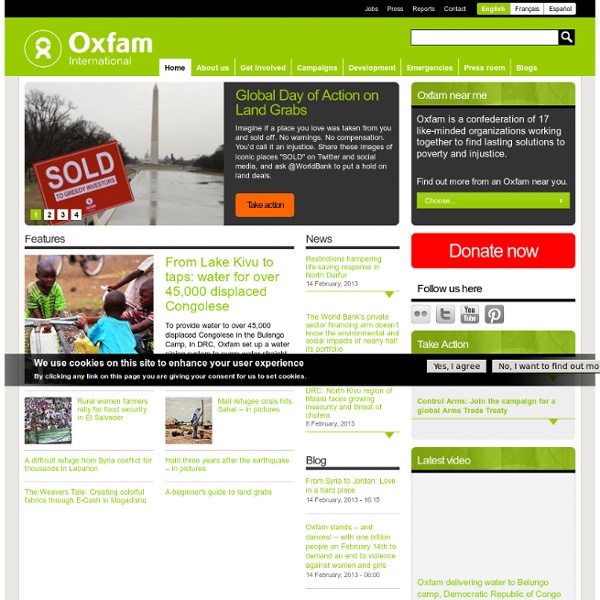



MIT Unveils Flexible Solar Cells Printed on Paper We’ve seen several different examples of printable solar cells in the past, however MIT engineers just unveiled a new type of cell that can be printed onto paper or fabric. The flexible photovoltaic cells are not energy intensive to produce and they can be folded over 1,000 times without any loss of performance. The technology was officially published today in the journal Advanced Materials by Professor of Electrical Engineering Vladimir Bulović and several other students. Instead of creating solar cells by exposing substrates to liquids or high temperatures, the team has developed a process that can produce solar cells on ordinary paper or cloth using ‘gentle’ conditions. The solar cells are formed by placing five layers of material onto a single sheet of paper in successive passes.
The Children's Project International Classement mondial 2013 Télécharger le rapportTélécharger la carte de la liberté de la presseLire en arabe (بالعربية)Lire en turc (Türkçe)Lire en italien (Italiano)Lire en allemand (Deutsch)Lire en chinois (看中文) Après les « printemps arabes » et les mouvements contestataires qui en 2011 avaient provoqué des hausses et des chutes, le Classement mondial de la liberté de la presse 2013 publié par Reporters sans frontières marque un retour à une configuration plus habituelle. Le rang d’un grand nombre de pays est moins lié à l’intensité de l’actualité politique. Ainsi, avec le Classement 2013, apprécie-t-on mieux l’attitude et les intentions des régimes vis-à-vis de la liberté de la presse à moyen et à long terme. En tête du classement, les trois pays européens qui occupaient les premières places l’an dernier composent à nouveau le trio de tête. Pour la troisième fois consécutive, la Finlande se distingue comme le pays le plus respectueux de la liberté de la presse.
The Ten Principles Email Home / About Us / The Ten Principles The Ten Principles The UN Global Compact's ten principles in the areas of human rights, labour, the environment and anti-corruption enjoy universal consensus and are derived from: The UN Global Compact asks companies to embrace, support and enact, within their sphere of influence, a set of core values in the areas of human rights, labour standards, the environment and anti-corruption: About Transition Network What does Transition Network do? Transition Network is a charitable organisation whose role is to inspire, encourage, connect, support and train communities as they self-organise around the Transition model, creating initiatives that rebuild resilience and reduce CO2 emissions. Ultimately it’s about creating a healthy human culture, one that meets our needs for community, livelihoods and fun. We’re here to support you. We run events, conferences, trainings, blogs, webinars.
Slow Communities Combien d’esclaves travaillent pour vous? Comment savoir si vos biens de consommation ont été confectionnés par des travailleurs forcés? Vous pouvez calculer votre empreinte-esclave grâce au site américain de Slavery Footprint. À Darjeeling en Inde, de jeunes garçons travaillent comme porteurs plutôt que d'aller à l'école. There Are Other Alternatives Earthbag Building Index A rare insight into Kowloon Walled City By Pamela Owen Published: 12:21 GMT, 5 May 2012 | Updated: 14:45 GMT, 5 May 2012 Once thought to be the most densely populated place on Earth, with 50,000 people crammed into only a few blocks, these fascinating pictures give a rare insight into the lives of those who lived Kowloon Walled City. Taken by Canadian photographer Greg Girard in collaboration with Ian Lamboth the pair spent five years familiarising themselves with the notorious Chinese city before it was demolished in 1992.
Respire A Blog by Perrine Bouhana on sustainability leadership, change, engagement & communications Architecture for Humanity